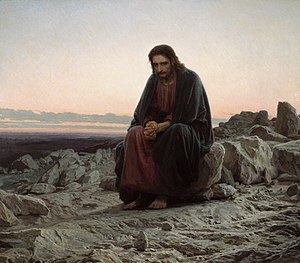Day 6 of 58, January 8
Reading
Matthew 4:1-17
https://www.biblegateway.com/passage/?search=Matthew%204:1-17&version=NIV
Scripture
Then Jesus was led by the Spirit into the wilderness to be tempted[a] by the devil. – 4:1
Observation
Why not provide overwhelming proof of God’s provision, protection, and power? “The Grand Inquisitor”, a parable from Dostoevsky’s novel Brothers Karamazov begs this question of Jesus’ temptation in the wilderness.
In the “Grand Inquisitor” (as a work of imaginative fiction), Jesus returns to 15th century Spain during he beginning of the Inquisition. He begins healing people, and drawing crowds. He essentially picks up his earthly ministry where it left off 15 centuries before.
He is arrested. A cardinal interrogates him. The interrogation essentially becomes a castigation of Jesus’ rejections of the three temptations in the wilderness we read about in Matthew 4.
The cardinal says Jesus should have turned the stones into bread because people should have freedom from hunger instead of freedom of choice.
The cardinal continues that Jesus should have thrown himself off the Temple to demonstrate the miracles of God for all to see, choosing freedom from doubt for all people over freedom to believe for each person.
Lastly, the cardinal excoriates Jesus for not bowing to the devil to receive power over all earthly kingdoms. The cardinal reasons Jesus could create a secure and prosperous world under one ruler. The cardinal thinks security is better than free will. He tells Jesus to go away and never return. Jesus departs, but not before kissing the cardinal (an ironic twist on Judas’ kiss of betrayal).
Today’s reading in Matthew makes me think about how each of us think at times, like the diabolical cardinal of Dostoevsky’s imagination, that we know better than the Lord Jesus Christ.
Application
If only the world had this or that, then everything would be better. If only we had more food or material wealth. If only we had more certainty or command over nature. If only we had more security or less choices to make mistakes.
It should be our greatest temptation to resist this kind of hubris and idolatry. After all, even the devil can quote scripture for his own schemes and purposes (v. 4:6). But the devil and the forces of evil desire to control us, and take away our freedom to respond to God’s call at the lakeshore. Jesus desires to love us, and share good news and healing with us. Each of us may have to wrestle with choice, faith, and humility in seeking God. Ultimately, we are better for seeking love that lasts for an eternity instead of security that withers within a lifespan.
Prayer
In closing, a hymn that express Jesus’ call to humble obedience is “Lord, You Have Come to the Lakeshore” by Cesáreo Gabaráin (UM Hymnal, No. 344):
“Lord, you have come to the lakeshore
looking neither for wealthy nor wise ones;
you only asked me to follow humbly.
O Lord, with your eyes you have searched me,
and while smiling have spoken my name;
now my boat’s left on the shoreline behind me;
by your side I will seek other seas.”
Image: “Christ in the Desert”, oil on canvas by Ivan Kramskoi, 1872

